#tami stronach
Text
NeverEnding Story Childlike Empress Tami Stronach returns with first film in 40 years.
Sean Astin narrates and voices Dog.
Watch the trailer here:
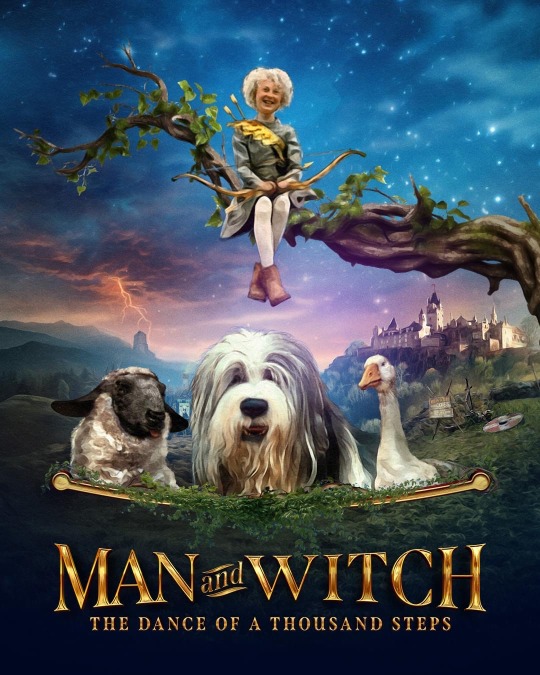
3 notes
·
View notes
Photo

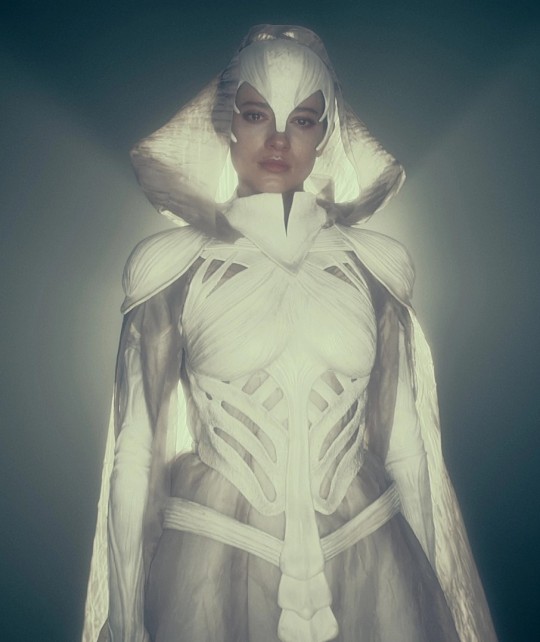
Is it just me or did Reya from Warrior Nun give Childlike Empress all grown up vibes.
11 notes
·
View notes
Text
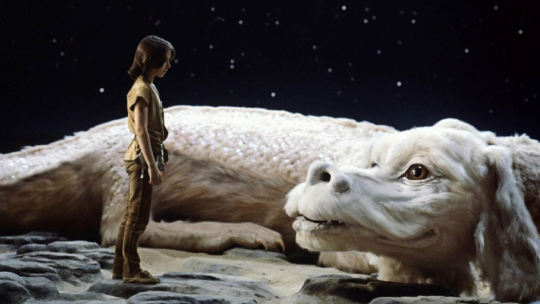
The Nothing, depressed horses, and dead moms–
The Neverending Story! (Whoa-oh-oh-oh-oh-oh-oh…)
On this week’s episode of Deep Thoughts About Stupid Sh*t, learn why the film adaptation of the novel of the same name so infuriated the book’s author that he sued to keep the film from being released.
Listen as @tguydecker relives the trauma of watching Artax be swallowed by the Swamp of Sadness.
Though neither the special effects nor the gender representation holds up, there is still much to enjoy in this allegory of grief that taught GenX that riding a luck dragon is the best revenge.
Listen here or check us out at guygirlsmedia.com.
#the neverending story#atreyu#artax#horse#80s movies#the nothing#gmork#michael ende#gen x#80s childhood#moonchild#childlike empress#wolfgang petersen#aleister crowley#noah hathaway#oliver barrett#tami stronach#falkor#luck dragon#bullies#morla the aged one#this was considered wholesome kids entertainment in the 80s#depressing shit#grief allegory#auryn#the power of reading#no one could hear what Bastian named her in the movie#the power of imagination#deep thoughts about stupid shit#deep thoughts
1 note
·
View note
Photo
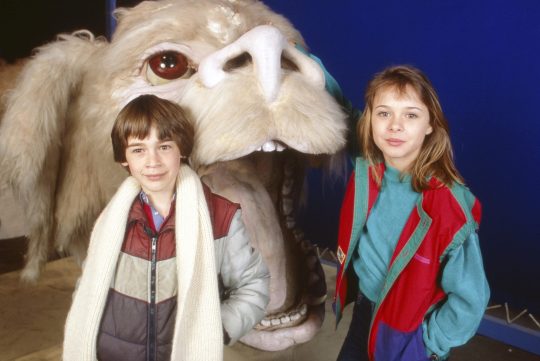


Behind the scenes of the Neverending Story with Barret Oliver and Tami Stronach in Bavaria Studios, Germany.
621 notes
·
View notes
Text
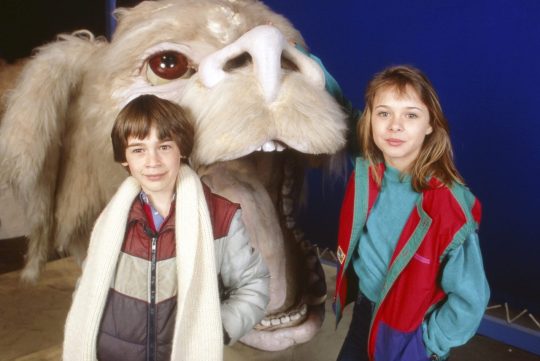
Barret Oliver and Tami Stronach behind-the-scenes of "The NeverEnding Story" at Bavaria Studios in Germany
9 notes
·
View notes
Text
Then and now:

Barret Oliver and Tami Stronach as Bastian and the Empress in The NeverEnding Story (1984)
3 notes
·
View notes
Text
The Cinema Movie Of The Week - The NeverEnding Story
Directed By Wolfgang Petersen
Story By Wolfgang Petersen and Herman Weigel
Based On The NeverEnding Story By Michael Ende
Starring Noah Hathaway, Barret Oliver, and Tami Stronach
Music By Klaus Doldinger and Giorgio Moroder
Distributed By Warner Btos.
Release Date July 20, 1984 (USA)
Country United States and West Germany

0 notes
Text
0 notes
Text
The Event Horizon, w/ guest Tami Stronach
Tami Stronach played the Childlike Empress in “The Neverending Story”, then fused her acting skills with dance and became a master of the medium.
Gene Turnbow, Susan Fox and Krypton Radio newcomer Christian Basel host.
This one is special, and you’re getting it before it airs on Krypton Radio because you’re one of the devoted fans who’s helping make all this possible.
If you’re only now just able…
View On WordPress
0 notes
Audio
(Literary License Podcast)
Pufnstuf (also known as Pufnstuf Zaps the World) is a 1970 American comedy fantasy musical film produced by Sid and Marty Krofft Enterprises and released by Universal Pictures. It is based on the children's television series H.R. Pufnstuf, a show that features a cast of puppets on a "living island."
The NeverEnding Story is a 1984 fantasy film co-written and directed by Wolfgang Petersen (in his first English-language film), and based on the 1979 novel The Neverending Story by Michael Ende. It was produced by Bernd Eichinger and Dieter Giessler, and stars Noah Hathaway, Barret Oliver, Tami Stronach, Patricia Hayes, Sydney Bromley, Gerald McRaney and Moses Gunn, with Alan Oppenheimer providing the voices of Falkor and Gmork (as well as other characters). It follows a boy who finds a magical book that tells of a young warrior who is given the task of stopping the Nothing, a dark force, from engulfing the wonderland world of Fantasia.
At the time of its release, it was the most expensive film produced outside the United States or the Soviet Union. It was the first in The NeverEnding Story film series. It adapts only the first half of the book, and consequently does not convey the message of the title as it was portrayed in the novel. The second half of the book was subsequently used as a rough basis for the second film, The NeverEnding Story II: The Next Chapter (1990). The third film, The NeverEnding Story III: Escape from Fantasia (1994), has an original plot not based on the book.
Opening Credits; Introduction (1.22); Background History (13.09); PufnStuf (1970) Trailer (29.44); Our Opening Presentation (16.29); Let's Rate (55.07); Introducing Our Next Feature (1:00.40); NeverEnding Story (1984) Trailer (1:02.11); Lights, Camera, Action (1:03.30); How Many Stars (1:41.31); End Credits (1:49.16); Closing Credits (1:51.23)
Opening Credits– Epidemic Sound – Copyright . All rights reserved
Closing Credits: NeverEnding Story by Limahl. Taken from the album Don’t Suppose. Copyright 1984 EMI Records/Zap the World by Billie Hayes and Martha Raye. Taken from the album PufnStuf. Copyright 1970 Capitol Records
Original Music copyrighted 2020 Dan Hughes Music and the Literary License Podcast.
All rights reserved. Used by Kind Permission.
All songs available through Amazon Music.
#SoundCloud#music#Literary License Podcast#Fantasy & Dreamy#Cartoons#Pufnstuf#Sid and Marty Kroft#NeverEnding Story
0 notes
Video
youtube
NEVERENDING STORY - CINEMA D'ASCOLTO - FILM ALLA RADIO
La compositrice e pianista Mariangela Ungaro, saggista di CINEMA D'ASCOLTO, ha collaborato con FILM ALLA RADIO, un podcast di Marco Pieroni, raccontando i film attraverso la loro colonna sonora. E' il caso del film LA STORIA INFINITA di cui ha rifatto la canzone dei titoli di coda, "Neverending story" brano di Limahl. LA STORIA INFINITA “La storia infinita” (Die unendliche Geschichte) è un film del 1984 diretto da Wolfgang Petersen. Una produzione internazionale tra Germania Ovest, USA e UK. Ispirato al romanzo omonimo di Michael Ende, è interpretato da Noah Hathaway, Barret Oliver e Tami Stronach nella sua prima apparizione cinematografica. Il suo budget di 25 milioni di dollari ne fece il più costoso film di produzione tedesca. Il film ha avuto due seguiti, che personalmente non ritengo all’altezza del primo film, in nessun senso. Un film assolutamente unico, asciutto, pieno di simbologie. Posso asserire con certezza che tutta la generazione di bambini nati negli anni Settanta ne è rimasta piacevolmente segnata. Un film convincente anche per la recitazione di attori giovanissimi come i tre protagonisti, che non hanno avuto però la fortuna successiva che avrebbero più che meritato anche da adulti. Le musiche sono di Giorgio Moroder, classe 1940, produttore discografico, compositore e Dj italiano, celebre per la sua musica elettronica, la disco music e l’uso di sintetizzatori. Lavorò per moltissimi celebri film degli anni Ottanta, quali, ad esempio, Flashdance, Top Gun, American Gigolò. Proprio lo stesso anno del film la Storia Infinita, lavorò alla riedizione del film “Metropolis” di Lang, introducendo una nuova e moderna colonna sonora rock. La versione innescò una querelle tra cinefili, con aperte critiche e apprezzamenti: io ho apprezzato e vi rimando alla lettura del saggio dedicato al film di Lang e al confronto tra le due colonne sonore. Moroder scrisse le musiche della storia infinita insieme al sassofonista e compositore tedesco Klaus Doldinger, classe 1936. La musica è tematica, come ci aspetteremmo in un film fantasy. Ho rintracciato i seguenti temi musicali, non tanto legati a questo o quel personaggio, ma a un concetto astratto: ● Tema del destino misterioso: due terze maggiori avvicinate da un intervallo di semitono, seguite da due terze minori, avvicinate nello stesso modo. ● Tema delle quinte: orchestrale, solenne, su quinte discendenti (le quinte sono distanti un tono) separate da lanci d’arpa veloci. ● Tema del volo o dell’avventura: archi tematici, corno di sostegno, che dà quella sensazione di grande spazio aperto, ritmo sostenuto. Il tema è preceduto da archi in accordi 9-8 (con ritardo della fondamentale), ravvicinati velocemente, per dare idea di so- spensione in aria (la stessa tecnica usata per il volo di E.T.). ● Tema dell’Imperatrice: solenne, costruito su quarte ascendenti avvicinate da un tono. ● Signal di Gmork: un segnale sonoro cupo e lacerante che de- scrive il servo del potere, un felino nero gigantesco dai penetranti occhi verdi, con artigli e fauci spaventosi, un essere crudele tra lupo e pantera: archi “isterici”, accordo breve, forte, dissonante, sincro- nizzato col ruggito inquietante della belva. ● Tema della Tristezza: tema di archi tematici su tappeto di archi e sinth, con punteggiatura di organo, solenne ma molto drammatico, basato su laceranti intervalli ascendenti di sesta, come a domandare “Perché?” Ogni tema è orchestrale ma non disdegna l’uso di campioni che ne rendono il sound abbastanza simile ai brani di Vangelis. La composizione sottesa utilizza in maniera molto interessante campi armonici mai scontati e cangianti in itinere. Vi è molta coerenza compositiva tra un brano e l’altro, come si addice ai grandi maestri compositori. ...continua su CINEMA D'ASCOLTO e su RADIO CORTONA FILM ALLA RADIO. https://mariangelaungaro.wixsite.com/stardust-art-studios/cinemadascolto https://www.boomplay.com/podcasts/28764 PER ACQUISTARE L'OPERA OMNIA SUL CINEMA MONDIALE: https://www.mondadoristore.it/Cinema-d-ascolto-Mariangela-Ungaro/eai979128078682/
0 notes
Text
Sean Astin narrates this teaser trailer for Man and Witch, starring Tami Stronach, the Childlike Empress, from the Neverending Story!
15 notes
·
View notes
Text
A Cameo video from Tami Stronach, the woman that played the Childlike Empress in The Neverending Story. I love that movie.
0 notes
Photo


#The NeverEnding Story#Noah Hathaway#Tami Stronach#Wolfgang Petersen#Michael Ende#Herman Weigel#Robert Easton#80s
182 notes
·
View notes
Photo
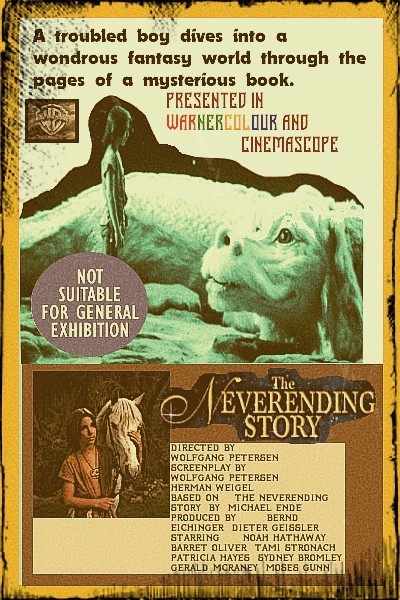
#the neverending story#movies#wolfgang petersen#noah hathaway#barret oliver#tami stronach#patricia hayes#sydney bromley#gerald mcraney#moses gunn#illustration#vintage art#alternative movie posters
19 notes
·
View notes
Photo

The NeverEnding Story (1984)
by Wolfgang Peterson
#Tami Stronach#noah hathaway#1980s movies#fanatsy#kids movie#moon child#bastian bux#Limahl#childlike empress
14 notes
·
View notes